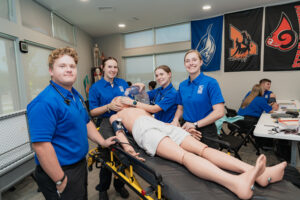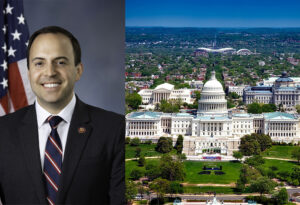Executive Summary
- This is the second update in a two-part series covering Senate and House budget plans for TRS this session.
- TRS reported to the House Appropriations Committee
- The TRS pension fund is actuarially sound, which opens the door for a COLA
- TRTA believes TRS members can and should receive a COLA
- TRS has been unable to sublease the Indeed Tower space
On February 23, 2021, the Texas House of Representatives Appropriations Committee met to discuss funding for several state agencies, including the Teacher Retirement System of Texas (TRS). The meeting was led by Chair Rep. Greg Bonnen (R – League City).
Pension Fund
TRS Executive Director Brian Guthrie reiterated the good news he shared about the pension trust fund with the Senate Finance Committee on February 22. He reported that the pension fund is actuarially sound.
Guthrie thanked the committee members for their commitment to helping make the fund sound last session through the passage of Senate Bill 12. SB 12 increased contributions using a stairstep from the state, school districts, and active employees. Eventually, state and active member contributions will match each other, starting in FY 2024.
Guthrie reported that the funding period, which is 27 years, is the lowest the system has been at since 2008. He also said that the 13th check received last session “was gratefully received by our members.” The supplemental payment was paid for through the Economic Stabilization Fund, also known as the Rainy Day Fund.
Guthrie reminded the committee members that the system lowered its investment return assumption last session from 8 percent to 7.25 percent based upon an experience study that is performed every four years, which led to the plan established by SB 12 to shore up the fund.
The fund reached a low point of $145 billion when the COVID-19 pandemic began. However, Guthrie said that the plan has “recovered quite nicely since then.”
Rep. Alex Dominguez prompted Guthrie about cost-of-living increases for retirees. “Could we get that done this session?”
According to Guthrie two criteria must first be met for a COLA.
- TRS must be actuarially sound (TRS currently meets that criteria).
- Any benefit enhancement would need to be authorized by the Texas Legislature.
Guthrie then reiterated his testimony from February 22, indicating that the two ways to pay for benefit increases are through upfront cash layouts or financed through the fund itself.
The Texas Retired Teachers Association (TRTA) not only believes that a COLA is possible this session, but also that the Texas Legislature should provide a COLA to retirees! We will provide more insight on a potential COLA in an upcoming Inside Line!
TRS-Care
When discussing the TRS-Care retiree health insurance plan, Director Guthrie stated that it was the first biennium since he had become the system’s director “that we have not asked for supplemental funding for this program.”
He repeated his testimony from the Senate Finance Committee that the alterations made to the plan in 2017 had been successful in controlling overall costs and that the procurement of a new insurer will save $700 million over time. “Finally,” Guthrie added, “one of the impacts is we lost membership, primarily dependents.” Some TRS members left with them.
Though the fund has a positive balance now, costs will again outstrip revenues in the future. “But we don’t anticipate needing extra money this biennium or the next,” Guthrie stated. Premiums will stay the same for TRS-Care participants for the coming biennium.
Rep. Steve Toth said he still hears from retirees in his district who “say benefits have decreased with their healthcare plan” and the cost of premiums “eats into their annuity check.”
Other committee members expressed similar concerns, particularly about the 30,000 people who left after changes were made in 2017 to overhaul the plan. Many inquired about whether or not those who leave the plan can come back.
TRS Chief Health Care Officer Katrina Daniel responded that if they left before the age of 65, they may return to enroll in the Medicare Advantage (MA) plan when they turn 65 or through a special enrollment event such as loss of coverage.
Daniel said, however, that once someone leaves the TRS-Care system, TRS has no way to track if they received health care coverage elsewhere.
The cost of healthcare nationally has been increasing, and the primary cost driver in TRS-Care is the population that is not Medicare eligible. About 67,000 plan participants are under age 65, while 160,000 are in the MA plan. Guthrie indicated that the average retirement age of a TRS member is 61, which is up from 59 in 2008.
Rep. Julie Johnson asked why it is so difficult for people to return to the plan once they leave. Daniel and Guthrie answered that it is hard to predict how participants returning will impact the financial position of TRS-Care, as it depends on a balance of healthier lives versus less healthy lives using the benefits. Anecdotally, Daniel indicated that there is a tendency for healthier people to leave insurance plans and to return to plans with richer benefits when their health declines.
Other committee members pointed out that the exodus of people from TRS-Care after the changes in 2017 had a lot to do with confusing and difficult decisions that members had to make in a very short period of time.
TRTA supports the idea of an open enrollment under controlled circumstances that would address these real-world scenarios.
Indeed Tower Discussion
Rep. Steve Toth asked Director Guthrie to expound upon TRS’s decision to lease space in the luxurious downtown Austin Indeed Tower.
Guthrie said that the decision was “based upon the fact that we have a significant ownership stake in the building and were already paying rent in another building downtown that we did not own.”
“Obviously, that was a poor decision,” Guthrie added. “We were not able to communicate the fact that we owned the building” with members of TRS. He said that the inability to disclose the ownership stake was included in a written opinion received from the Attorney General.
“My goal is to get all of our employees in a building that we own, in the same space,” Guthrie added. The system hopes to eventually have no lease space at all.
TRS receives an investment return on the Indeed Tower and that occupying the space builds investment value. However, if TRS is unable to lease the space, it will carry the bill for the space.
Rep. Terry Wilson asked if TRS members would have benefitted from this business decision.
Guthrie said the building was meant to be part of the system’s real estate portfolio, long before a decision was made to lease space for the Investment Management Division (IMD) employees. The IMD is presently housed in another building at 816 Congress, where the monthly rent is $350,000.
With the Indeed Tower, Guthrie said that TRS would have been “paying some portion of that rent back to ourselves.” The rent at Indeed Tower will be $400,000 per month, a fee the system must begin paying by November 2021 if the space cannot be sub-leased by that time.
TRS is actively working to find a tenant, though snags were encountered when the pandemic began. Guthrie feels confident that the space can be leased, as the “real estate market starting to wake up,” but confirmed that TRS will not move into the building even if is not subleased by November.
Retire, Rehire
Rep. Cecil Bell asked Guthrie about retire/rehire policies. Under current statute, TRS members can lose an entire monthly annuity even if they only worked one or two hours over their allotment. Guthrie said TRS was “trying to come up with a solution that does not have a negative actuarial impact on the fund.”
Rep. Gene Wu, who tried to get a bill through last session to help rehired retirees who may have exceeded their work hours inadvertently, said “the cure is so punitive … it’s heartbreaking.”
Wu said the issue of retirees going back to work has come up a lot during pandemic because school districts need extra help. He asked if TRS can give them a warning before penalizing them. Guthrie said no solution had been created yet and that TRS receives monthly reports from the school districts, but by that time a retiree may have already exceeded their hours.
“We don’t know until after a violation has occurred,” he added. Guthrie said he does not have the flexibility based on current law to remove penalties and that statutory change is required.
Thank You
The Texas Legislative session is really heating up. We are covering the issues that matter to you from all angles. Please let your fellow TRS retirees know that TRTA staff and volunteers are working on their behalf and ask them to join the organization if they are not already a member!
The next major item this week will be a House Appropriations Subcommittee meeting on TRS set for Thursday, February 25, 2021. TRTA will be ready to testify for our members at that hearing. The meeting will begin at 9:00 a.m. and live link to the meeting webcast will be available from this link a few minutes before it convenes.
Thank YOU for being a member of TRTA! Be sure to download the TRTA app to receive all of the latest legislative updates.




